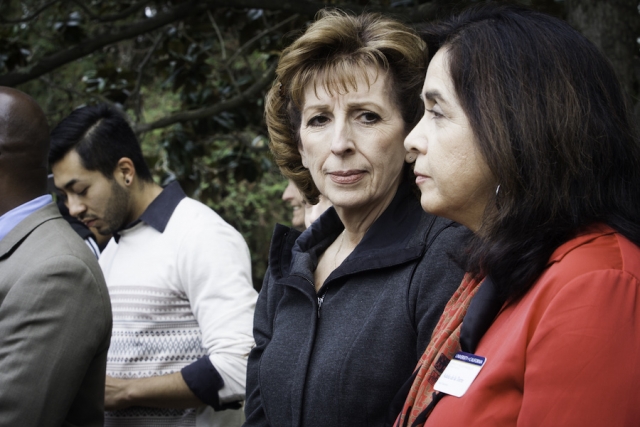
Katehi responds to criticism that she should have resigned earlier
The Sacramento Bee reported on March 24 that nearly $1 million was spent investigating former UC Davis Chancellor Linda P.B. Katehi, according to information released by the UC Office of the President (UCOP).
Last April, UC President Janet Napolitano ordered a four-month investigation into various allegations against Katehi. The investigation focused on Katehi’s acceptance of board seats for DeVry Education Group and textbook publisher John Wiley & Sons, improper use of student fees, nepotism and involvement in the payment of hundreds of thousands of dollars to public relations firms to clean up her and the university’s online reputations after the 2011 pepper spray incident. Katehi resigned on August 9, 2016, the same day the investigative report was released. She was offered a year’s salary with benefits while placed on leave.
The probe was conducted by the law firm of Orrick, Herrington & Sutcliff LLP. Dianne Klein, the press secretary and executive director of strategic communications of the Office of the President, provided a statement to The Bee regarding the exact cost of the investigation.
“After taking into account the discounted hourly billing rates and other fee accommodations that the firm agreed to, the final cost to UC will be $988,142.75 for Orrick’s fees and expenses,” Klein wrote in an email to The Bee. “The funds used to pay for the investigation come from the presidential endowment, which does not include any state or tuition dollars.”
Many people feel that the amount of money spent on the investigation could have been allocated elsewhere to provide more resources to students and faculty.
“The big losers in this are the students at the University of California, Davis specifically, and the University of California generally,” said Ed Howard, of the Center for Public Interest Law, to The Bee. “If you think of the number of scholarships or the number of computers, or the excellent professors or programs that could have been paid for with that nearly million dollars, that is just tragic.”
Connor Gorman, a fourth-year graduate student in the Physics Department who was an active participant in the Fire Katehi movement, expressed a similar sentiment.
“Obviously I think it’s ridiculous,” Gorman said. “That money could have been used for other things […] on students, we need so many things. We need more counselors, we need more housing, we need more classes. Tuition also just increased.”
Gorman also expressed his displeasure with the lack of credit given to activists — who held protests and camped out in Mrak Hall for weeks — for their contribution in Katehi’s resignation, since it was amid this student activism that Napolitano put Katehi on a paid leave. According to Klein, Katehi was placed on paid leave because she refused Napolitano’s request for her resignation.
“As you know — but it bears repeating — all of this could have been avoided had Katehi resigned as chancellor of UC Davis as President Napolitano had asked,” Klein wrote in her email to The Bee. “Instead, in direct contravention to the agreement she and the president had made to keep the matter confidential until the terms of the resignation could be finalized, the chancellor waged a public campaign to keep her position while at the same time denying any wrongdoing.
Katehi believes that the investigation last year and the allegations presented against her were not represented well by the statements made by the UCOP, having sent out several tweets against the article by the Davis Enterprise. One tweet read: “I have been working in Higher Ed in the US for 38 years. This is the first time I have experienced this treatment.”
Katehi feels that the UCOP was trying to place the blame on her for the expensive investigation.
“The only thing a President has to do is to ask the Chancellor to leave the position,” Katehi said. “That happens all the time and there are many respectful ways to allow the Chancellor to step down from the position.”
Katehi maintains that she and her family were threatened and that she was asked to leave her position without any proof that she violated the trust of the university or the law.
“I was asked to leave the university and I am a distinguished faculty member. I have tenure,” Katehi said. “There is a process the UC Senate takes if tenure is to be removed for a faculty member.”
Katehi believes the whole development of the investigation could have been avoided if the UC president had asked her to step down from chancellor by justifying the accusations instead of threatening her and her family.
“There was no need for an investigation,” Katehi said. “The only thing that the president should have done was tell me for all the reasons she wanted me to step down from my position. But this is not what happened. What happened was that I was threatened that I and my family will be investigated unless I would leave the university, not just the chancellor position. […] I am a member of the National Academy of Engineering and am one of the most cited engineering women in the U.S. and around the world. I would not leave the university overnight as a thief without knowing why I’m leaving the university.”
Katehi believes that the funds might have been better used to support universities and the students, and hopes that UC Davis can focus on improving education and research, increasing the number of scholarships provided and improving the quality of teaching and facilities. Katehi plans to return to UC Davis in the fall as an electrical engineering professor and researcher.
Written by: Jayashri Padmanabhan — campus@theaggie.org




